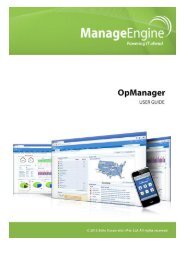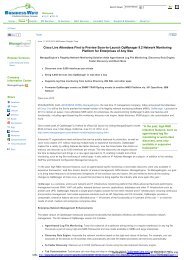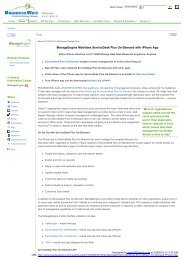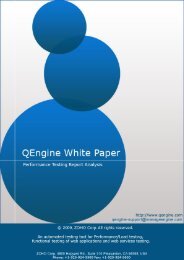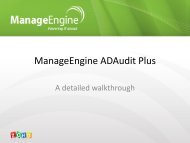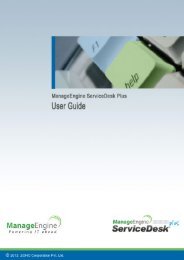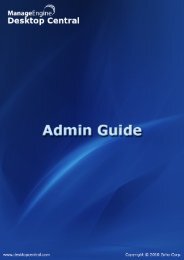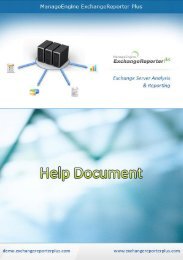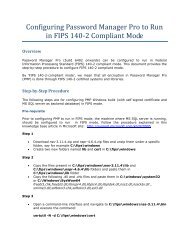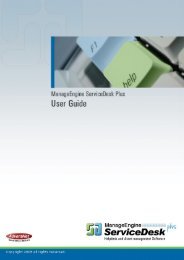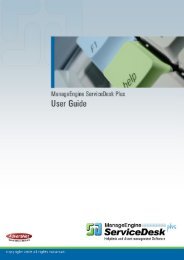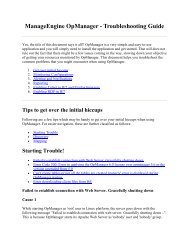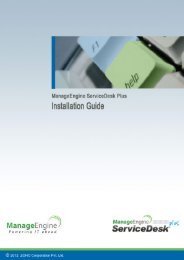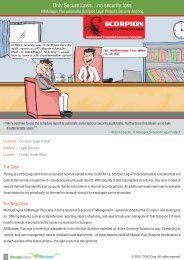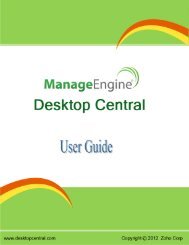- Page 2 and 3: ManageEngine ADManager Plus :: Help
- Page 4 and 5: ManageEngine ADManager Plus :: Help
- Page 6 and 7: ManageEngine ADManager Plus :: Help
- Page 8 and 9: Release Notes The key features of t
- Page 10 and 11: ManageEngine ADManager Plus :: Help
- Page 14 and 15: Active Directory Terminologies Mana
- Page 16 and 17: System Requirements • Hardware Re
- Page 18 and 19: Uninstalling ADManager Plus ManageE
- Page 20 and 21: ManageEngine ADManager Plus :: Help
- Page 22 and 23: Working with ADManager Plus • Sta
- Page 24 and 25: Installing Service Packs ManageEngi
- Page 26 and 27: Licensing ADManager Plus ManageEngi
- Page 28 and 29: Configuring Domains ManageEngine AD
- Page 30 and 31: ManageEngine ADManager Plus :: Help
- Page 32 and 33: ManageEngine ADManager Plus :: Help
- Page 34 and 35: ManageEngine ADManager Plus :: Help
- Page 36 and 37: Delete Contacts ManageEngine ADMana
- Page 38 and 39: Modify Group in Active Directory Ma
- Page 40 and 41: ManageEngine ADManager Plus :: Help
- Page 42 and 43: Creating a Single User ManageEngine
- Page 44 and 45: Creating Bulk Users ManageEngine AD
- Page 46 and 47: ManageEngine ADManager Plus :: Help
- Page 48 and 49: ManageEngine ADManager Plus :: Help
- Page 50 and 51: ManageEngine ADManager Plus :: Help
- Page 52 and 53: ManageEngine ADManager Plus :: Help
- Page 54 and 55: ManageEngine ADManager Plus :: Help
- Page 56 and 57: Modifying Naming Attributes ManageE
- Page 58 and 59: ManageEngine ADManager Plus :: Help
- Page 60 and 61: Modifying Contact Attributes Manage
- Page 62 and 63:
ManageEngine ADManager Plus :: Help
- Page 64 and 65:
ManageEngine ADManager Plus :: Help
- Page 66 and 67:
Modify Custom Attributes ManageEngi
- Page 68 and 69:
Dial-in or VPN properties ManageEng
- Page 70 and 71:
Modifying User Profiles ManageEngin
- Page 72 and 73:
Modifying Session Attributes Manage
- Page 74 and 75:
Creating User Templates ManageEngin
- Page 76 and 77:
ManageEngine ADManager Plus :: Help
- Page 78 and 79:
ManageEngine ADManager Plus :: Help
- Page 80 and 81:
Enable-Disable Computers ManageEngi
- Page 82 and 83:
Modifying Group Attributes ManageEn
- Page 84 and 85:
ManageEngine ADManager Plus :: Help
- Page 86 and 87:
Bulk Group Management ManageEngine
- Page 88 and 89:
CSV Based Group Management ManageEn
- Page 90 and 91:
ManageEngine ADManager Plus :: Help
- Page 92 and 93:
Address/Organization Attributes Man
- Page 94 and 95:
Contact Attributes ManageEngine ADM
- Page 96 and 97:
Delete Contacts ManageEngine ADMana
- Page 98 and 99:
Modifying Delivery Restrictions Man
- Page 100 and 101:
ManageEngine ADManager Plus :: Help
- Page 102 and 103:
Modifying Storage Limits ManageEngi
- Page 104 and 105:
Modifying Exchange Features ManageE
- Page 106 and 107:
Exchange Off-line Address Book Mana
- Page 108 and 109:
Active Directory User Reports • G
- Page 110 and 111:
Recently Modified Users ManageEngin
- Page 112 and 113:
ManageEngine ADManager Plus :: Help
- Page 114 and 115:
ManageEngine ADManager Plus :: Help
- Page 116 and 117:
ManageEngine ADManager Plus :: Help
- Page 118 and 119:
ManageEngine ADManager Plus :: Help
- Page 120 and 121:
ManageEngine ADManager Plus :: Help
- Page 122 and 123:
ManageEngine ADManager Plus :: Help
- Page 124 and 125:
ManageEngine ADManager Plus :: Help
- Page 126 and 127:
Users with Email Proxy addresses Re
- Page 128 and 129:
ManageEngine ADManager Plus :: Help
- Page 130 and 131:
OWA Disabled users Report This prov
- Page 132 and 133:
Active Directory GPO Reports Manage
- Page 134 and 135:
To view the report, select the doma
- Page 136 and 137:
ManageEngine ADManager Plus :: Help
- Page 138 and 139:
Non-Inheritable Folders/Files Manag
- Page 140 and 141:
3. Click on Generate button Permiss
- Page 142 and 143:
Scheduling Reports Overview ManageE
- Page 144 and 145:
To disable a schedule, ManageEngine
- Page 146 and 147:
Help Desk Delegation Overview Manag
- Page 148 and 149:
Note: ManageEngine ADManager Plus :
- Page 150 and 151:
Note: ManageEngine ADManager Plus :
- Page 152 and 153:
ManageEngine ADManager Plus :: Help
- Page 154 and 155:
Creating Security Roles ManageEngin
- Page 156 and 157:
Modifying Security Roles ManageEngi
- Page 158 and 159:
Built-in Security Roles ManageEngin
- Page 160 and 161:
Customizing Naming Format ManageEng
- Page 162 and 163:
Offices & Companies ManageEngine AD
- Page 164 and 165:
Customizing LDAP Attributes ManageE
- Page 166 and 167:
AD Search Settings You can Configur
- Page 168 and 169:
Server Settings ManageEngine ADMana
- Page 170 and 171:
Personalize Settings ManageEngine A
- Page 172 and 173:
Web based people search ManageEngin
- Page 174 and 175:
Active Directory Explorer ManageEng
- Page 176 and 177:
ManageEngine ADManager Plus :: Help
- Page 178 and 179:
ManageEngine ADManager Plus :: Help
- Page 180 and 181:
ManageEngine ADManager Plus :: Help
- Page 182 and 183:
General 1. What is ADManager Plus?
- Page 184 and 185:
3. Web-based management. ManageEngi
- Page 186 and 187:
Known Issues and Limitations Manage



